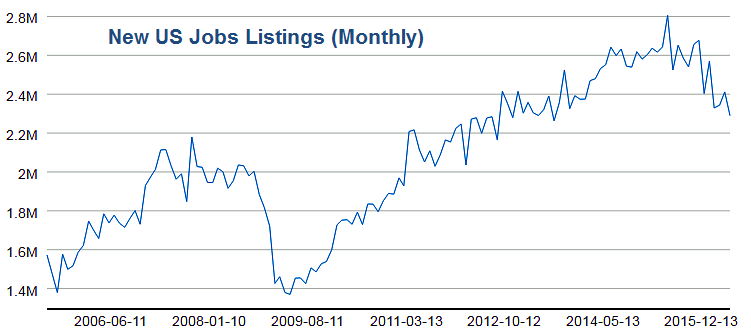Following the big jobs miss last Friday, we recently showed that this trend is likely to continue without a turnaround in leading employment indicators—specifically, bank tightening and temp employment (see Why Big Job Misses Are Likely to Continue).
Another important data point that we've been keeping our eye on is online jobs listings, which, as we noted last month, were beginning to plunge and rollover in a manner similar to the last US recession (see Plunge in Online Job Postings Raises Red Flag).
Our contact for this information is Jon Hartley at Real Time Macroeconomics who previously worked at the Federal Reserve, Dallas Cowboys, and Goldman Sachs Asset Management as a quantitative analyst, economic researcher, and data scientist of sorts.
When we spoke to him a couple months ago on our podcast about his company and using real-time online data for tracking changes in the economy (see Jon Hartley on Real-Time Macroeconomic Outlook), he said there were some signs of leveling off but no clear red flags just yet.
Since that time, however, the data they track has moved from leveling off to outright decline and Jon just recently emailed us to say he is now "leaning toward forecasting a likely downturn/recessionary scenario" and said, "I don't think last week's poor jobs report was just a blip."
Here's a chart showing their most recent update on the online jobs listings front (current through May 31st):

Source: Real Time Macroeconomics
Though the data only goes back around 10 years, it's clearly rolled over in a manner similar to the last recession. As we noted last month, if the online data is providing a more accurate picture of the US economy vs. the official government surveys, then "expect to see a string of downward revisions" and continued misses moving forward. Last week that prediction was fulfilled quite strongly with only 38,000 jobs added and heavy downward revisions to the two prior months.
We recently spoke with Bob Eisenbeis, Cumberland Advisors' Chief Monetary Economist and former Executive Vice-President at the Federal Reserve Bank of Atlanta, who made a very interesting observation on our show (see here). Given the economic uncertainties currently present (he specifically cited the Great Depression as our closest parallel), forecast errors on government data will tend to be larger than normal.
The big worry, Eisenbeis said, is that US productivity continues to slow, which, as we recently discussed (see Chad Syverson Busts the Labor Productivity Mismeasurement Thesis), is in all likelihood not a measurement issue, but more structural in nature. Unfortunately, there's not much that monetary policy can do about this.
For a complete archive of our podcast interviews on finance, economics, and the market, visit our Newshour page here or iTunes page here. Subscribe to our weekly premium podcast by clicking here.






